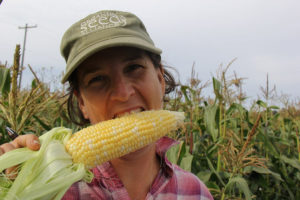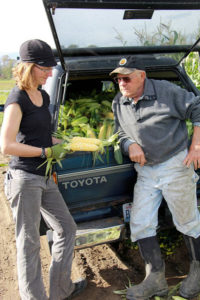
Sweet corn loves sun and heat, two qualities not often found in the cool and wet Olympic Peninsula climate. Organic farmers in the area don’t have many options: The best available varieties on the market come from seed bred for conventional, chemically intensive agricultural systems.
But as part of a joint organic plant-breeding project, OSA researchers are evaluating breeding plots of a new organic, early-maturing, open-pollinated sweet corn variety being developed on the Olympic Peninsula. (And it’s delicious!)
The key players in the project represent very different points along the food-system chain:
- An organic plant breeder: University of Wisconsin – Madison
- Organic seed researchers and advocates: OSA, Washington State University Twin Vista Farm and Ranch, Northern Organic Vegetable Improvement Collaborative
- Local farmers: Nash Huber of Nash’s Organic Produce, Organic Farm School
- An organic food market: Port Townsend Food Co-op
The project’s success stems directly from the diversity of stakeholders, all of which provide unique skills and expertise that will continue to improve the crop as it culminates in a new organic sweet corn variety adapted for the Olympic Peninsula.

But this project is about more than just ensuring sweet corn enthusiasts in the Pacific Northwest and Northern California (we’re working on breeding for organic farmers there, too) have access to delicious, organic sweet corn. It’s also an example of how, when we work together, we can adapt seed to various climates. And providing regionally adapted organic seed that farmers can save is a critical tool in climate adaptation.
Saving seed may not seem revolutionary, but it is one of the most powerful ways that we can manage climate change. Farmers are among the first to notice how crops react to weather events, pests, and disease, which means they can identify which varieties adapt better to disturbance than others.
Open-pollinated seed that has been bred specifically for organic use allows farmers to save the seeds of plants that respond best to their local conditions. And as conditions continue to change, giving farmers the power to continually adapt is a critical component of food security. That’s why we published How to Breed Sweet Corn for Organic Agriculture, a manual that teaches farmers on-farm plant breeding techniques for adapting open-pollinated sweet corn to their farm, climate, and markets.
In a few years, we hope to release ‘Olympic’ sweet corn to the commercial market so that more farmers have access to high-quality, open-pollinated, and regionally adapted sweet corn seed that was developed for organic agriculture.
